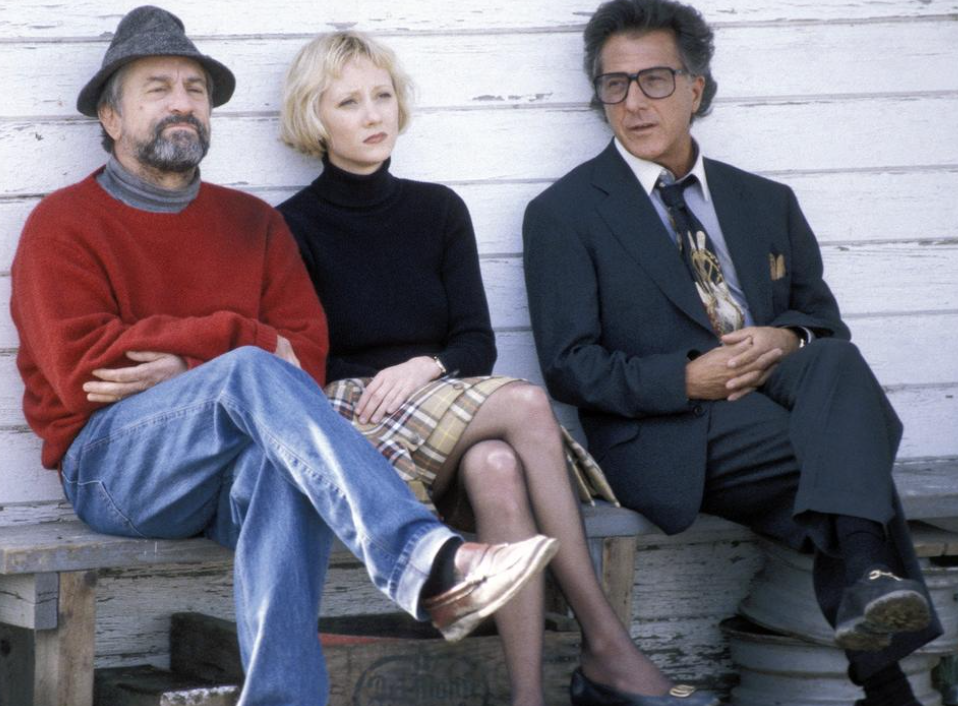 When “Wag the Dog” hit theaters on Christmas 1997, nothing could have seemed more cleverly prescient. About a fake war staged to draw focus from a first-term U.S. president’s sex scandal, the film was released a month before then-President Clinton was accused of having sex with intern Monica Lewinsky and an Al-Shifa pharmaceutical factory in Sudan was subsequently bombed by the U.S. Viewed ten years later, this dark comedy seemed even more relevant. Though the world was verging on an economic meltdown after the collapse of the subprime mortgage market, the media was distracted by Britney Spears’ nervous breakdown and Brangelina’s growing brood. Only today does this adaptation of Larry Beinhart’s novel American Hero read as depressingly dated — if only because we have entered a new era of fake news and governmental deception.
When “Wag the Dog” hit theaters on Christmas 1997, nothing could have seemed more cleverly prescient. About a fake war staged to draw focus from a first-term U.S. president’s sex scandal, the film was released a month before then-President Clinton was accused of having sex with intern Monica Lewinsky and an Al-Shifa pharmaceutical factory in Sudan was subsequently bombed by the U.S. Viewed ten years later, this dark comedy seemed even more relevant. Though the world was verging on an economic meltdown after the collapse of the subprime mortgage market, the media was distracted by Britney Spears’ nervous breakdown and Brangelina’s growing brood. Only today does this adaptation of Larry Beinhart’s novel American Hero read as depressingly dated — if only because we have entered a new era of fake news and governmental deception.
Make no mistake: With director Barry Levinson and co-writers David Mamet and Hilary Henkin at the helm, “Wag the Dog” remains one of the sharpest political satires of the last few decades — a rat-a-tat-tat screwball in the glorious tradition of Preston Sturges, with a little May and Nichols thrown in for good measure. Robert De Niro stars as Conrad “Connie” Brean, a spin doctor whose bumbling affability is belied by his sharp gaze. Hired by White House aide Winifred Ames (Anne Heche in sexy schoolmarm mode) to distract the nation from the sitting U.S. president’s alleged sexual assault of a campfire girl, he enlists Hollywood producer Stanley Motss (Dustin Hoffman), a fast-talking Swifty Lazaar type with a Liberace bouffant, to engineer a fake war with Albania to change the headlines in the days before the election.
“Why Albania? What did they ever do to us?” someone asks Connie, and his response says it all: “What did they ever do for us?”
Along with marketing genius Fad King (Denis Leary in German military drag) and a gorgeously deadpan Willie Nelson as resident songwriter, Motss produces a war “teaser” entailing a “We Are the World”-style theme song, an Albanian girl scurrying against a greenscreened bomb site (a young Kirsten Dunst clutching a bag of Tostitos digitally remastered as a kitten), a war logo designed for the networks, and Woody Harrelson as a fake war hero blitzed out on an ineffective buffet of psychotropics. It’s a dazzzling display, especially with Connie pulling strings behind the red, white, and blue curtain. Consider how he advises his communication team to fend off press queries about the President’s extended stay in China. (He’s being kept out of the media firestorm until it’s put it out.)
a greenscreened bomb site (a young Kirsten Dunst clutching a bag of Tostitos digitally remastered as a kitten), a war logo designed for the networks, and Woody Harrelson as a fake war hero blitzed out on an ineffective buffet of psychotropics. It’s a dazzzling display, especially with Connie pulling strings behind the red, white, and blue curtain. Consider how he advises his communication team to fend off press queries about the President’s extended stay in China. (He’s being kept out of the media firestorm until it’s put it out.)
Connie: “The President’s trip has to do with trade relations. It has nothing to do with the B3 bomb.”
Winifred: “There is no B3 bomb.”
Connie: “You’re goddamn right.”
Cut to a media investigation of a B3 bomb.
Before you know it, the CIA climbs on board and there’s a bona fide military funeral and war with Albania. Or is there? One of the running gags of this film is the suggestion that such political events as Kennedy’s assassination and the war in Grenada also were manufactured to draw focus from other scandals. The bigger point is how easy it is to whip up patriotic frenzies, and how often American public policy is founded on fraud on the highest levels.
On the face of it, not much seems to have changed in U.S. politics and media since the initial release of this film. “Change the story, change the lede” is still the name of the game, and as recently as last month the shady Project Veritas was accused of hiring a woman to feed a “Fake News” story about Roy Moore to the Washington Post.
The difference is the overall means. With the advent of social media and smartphones, a culture of blatancy presides in which anything can be revealed and faked all at once. In the midst of this false transparency, we have a Tweeter-in-Chief who bypasses the press corp entirely, changing the headlines himself with  statements as offensive and false as his puff of Cheetos-colored hair.
statements as offensive and false as his puff of Cheetos-colored hair.
The lies are bald now — as bald as our national bird, as bald as our ostensible leader’s ego. In this post-Mamet world, there is no double talk and there is no subterfuge. Rather, there is superfuge. Go on and pretend that’s a word, because it should be — which, in this current climate, means it is. Wag the Dog, indeed. The question is: Who’s wagging who?
This was originally published at Signature.
